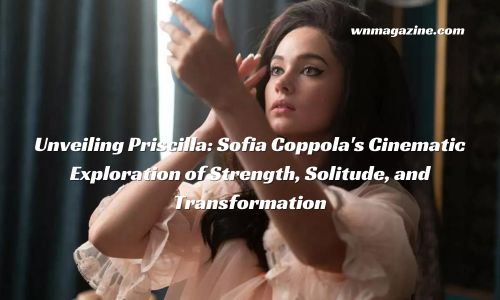Unveiling Priscilla: Sofia Coppola’s Cinematic Exploration of Strength, Solitude, and Transformation

Unveiling Priscilla: Sofia Coppola's Cinematic Exploration of Strength, Solitude, and Transformation
Sofia Coppola’s film, “Priscilla,” poses a compelling question as it revolves around a character immersed in a world of captivating yet misunderstood and profoundly solitary women—familiar territory for Coppola, given her previous works like “The Virgin Suicides,” “Lost in Translation,” and “Marie Antoinette.” However, Priscilla Presley is no fictional creation. Serving as the executive producer of the film, she is the wife of Elvis Presley and the author of the 1985 memoir “Elvis and Me,” co-written with Sandra Harmon, which forms the basis for Coppola’s cinematic narrative. For those seeking empowerment through storytelling, Priscilla’s story stands as a poignant example.
Despite being overshadowed by her husband’s legendary status, Priscilla Presley takes center stage in this tale. The tumultuous marriage of the Presleys unfolds at a measured pace in the film, with Priscilla’s perspective being an honorable addition to Coppola’s repertoire. Coppola, known for her ability to explore the inner lives of women navigating privilege and powerful relationships, skillfully unveils the layers beyond the myths surrounding these women.
The casting choice of Cailee Spaeny as Priscilla proves to be a masterstroke. From the moment Priscilla leans into Elvis (played by Jacob Elordi) in 1959, their paths intersect in a captivating narrative. Spaeny’s portrayal evolves seamlessly, capturing Priscilla’s growth from a starry-eyed teenager to a troubled adult.
Also Read : Wellhealthorganic home remedies tag For Skin
The film captures pivotal moments, such as Priscilla blushing at the mention of attending a party with Elvis and the commentary from others on her age. Elvis’s connection with Priscilla, mature beyond her years in his eyes, echoes the themes of connection and homesickness seen in Coppola’s “Lost in Translation.” Their relationship, while nuanced and unsettling, avoids explicit terms like “grooming” and “abuse” in the narrative.
The film’s conclusion may lack grand declarations, yet its quiet tenderness is its strength. Priscilla’s departure from Graceland into a new life is marked by a composed expression, signifying freedom, harmony, and new beginnings. The film doesn’t sensationalize Priscilla’s story; instead, it emphasizes the strength found in quiet resilience and the transformative power of personal growth.





